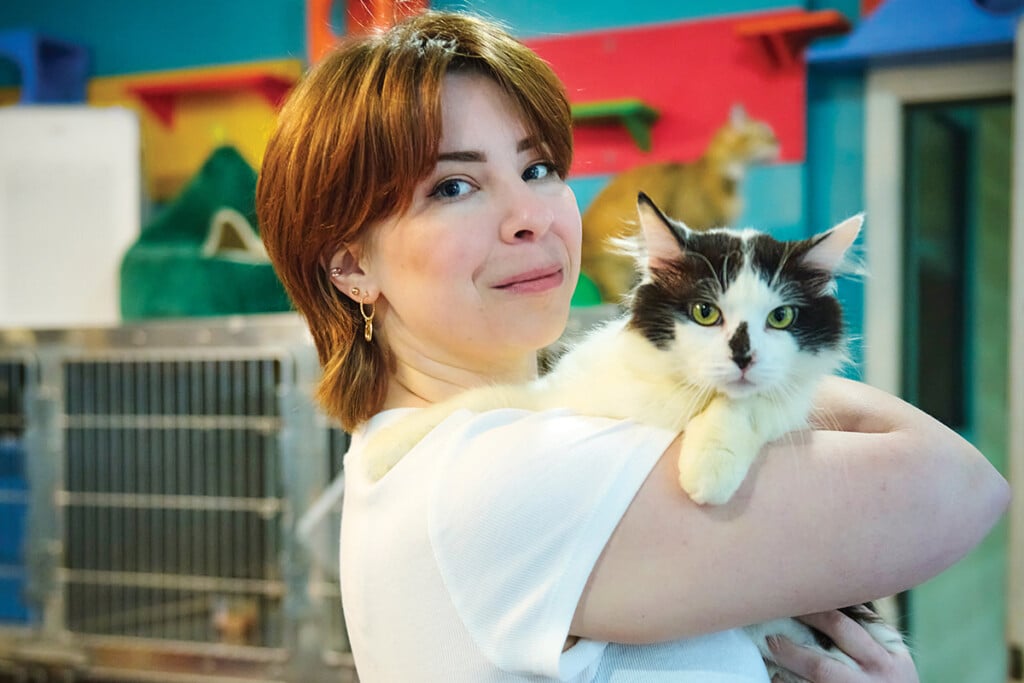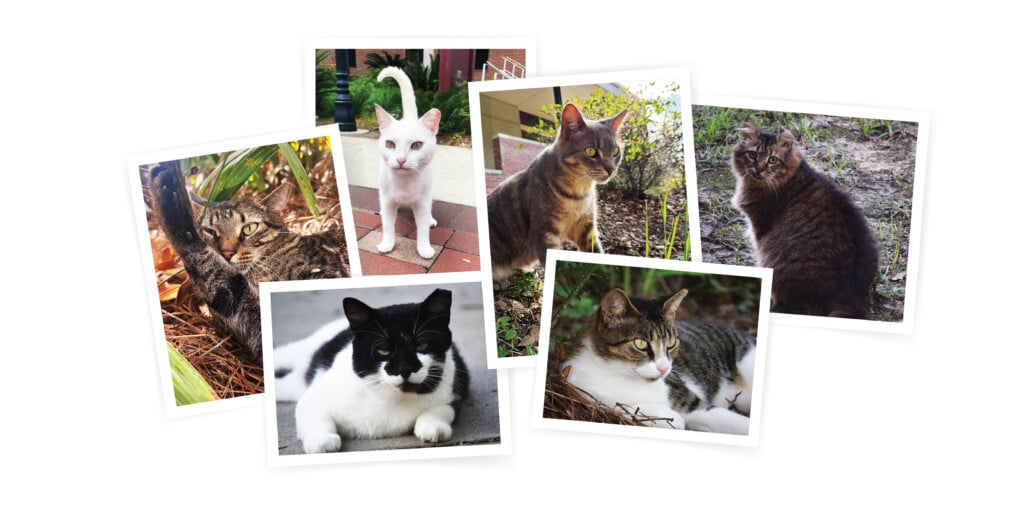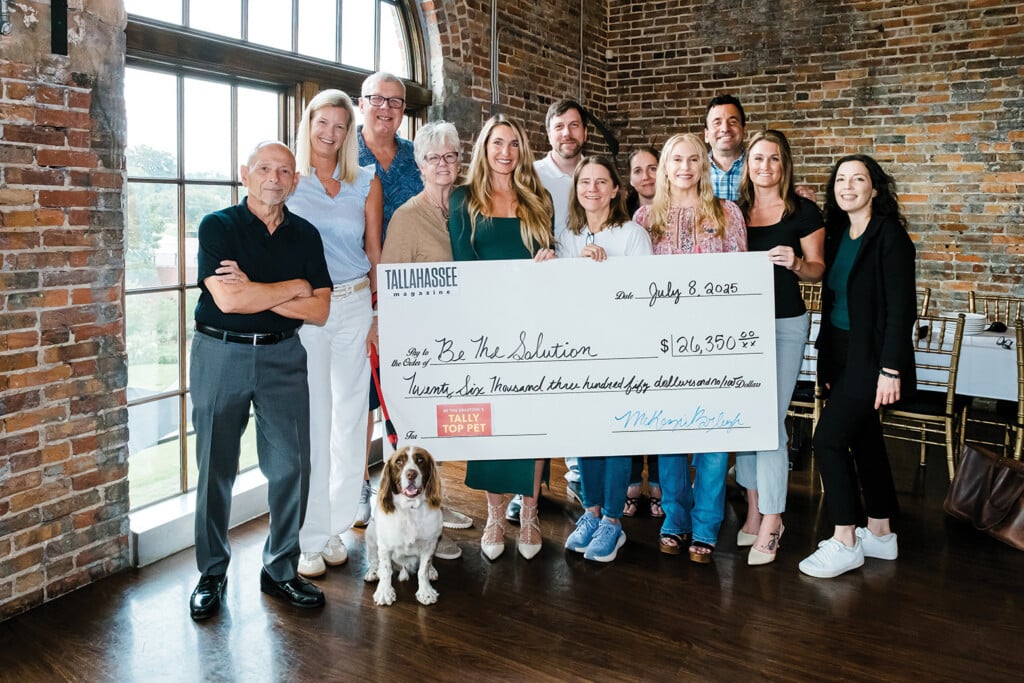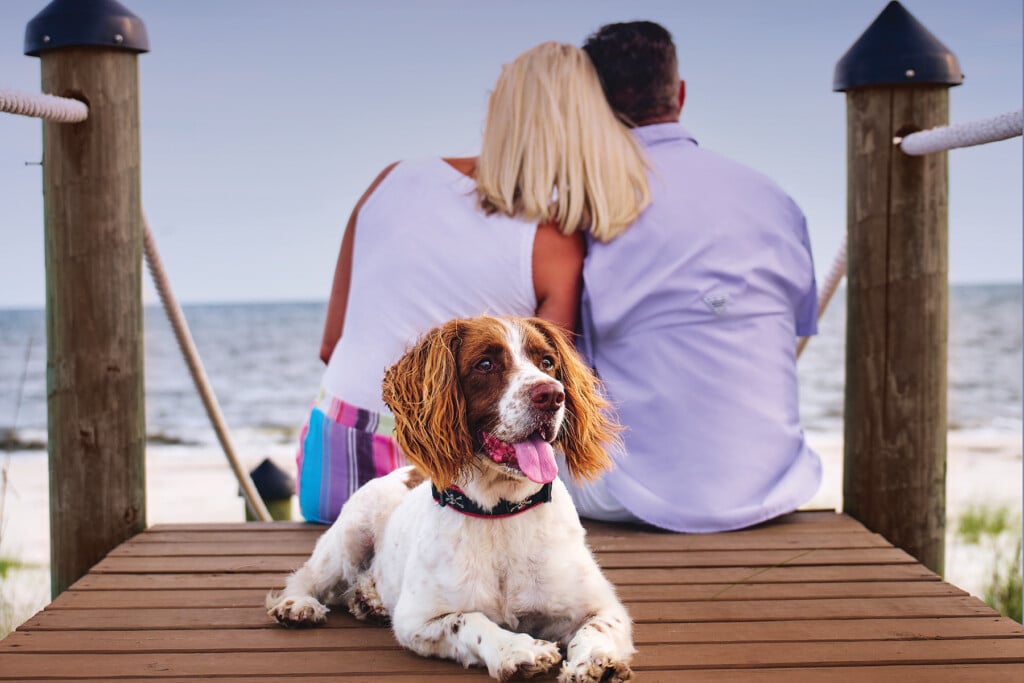In the Arms of an Angel
Volunteers help keep local shelters afloat

Caring for an animal takes time, patience, money and lots of love. After all, they can’t drive to their vet appointments or feed and clean up after themselves. They certainly can’t get a job to cover their expenses, and even the most independent pets require regular playtime with people or other animals.
Now, imagine all that goes into caring for one animal and multiply that by 1,000. That’s the average workload the Leon County Humane Society (LCHS) faces annually. While the nonprofit shelter receives support from the community through donations, fundraising events and foundation grants, it doesn’t receive any state, local or federal funding.
A small full-time staff relies heavily on volunteers to keep things running smoothly.
“We’re one of the main sources for pet and animal education in the city, and we’re constantly answering calls and helping people who don’t understand the difference between the Humane Society and the city shelter or people who don’t understand that we aren’t animal control,” said LCHS Volunteer Coordinator Courtney Kendrick.
“It’s super helpful to have volunteers to rely on,” she continued. “Not only do the animals rely on the extra labor, but it really lightens our load because we are overstretched all the time.”
Kendrick said LCHS regularly worked with over 100 volunteers, but that number took a hit during the pandemic.
“I had to completely rebuild the volunteer program almost from scratch,” Kendrick said, adding that LCHS had about 20 consistent volunteers post-pandemic. Now, they have 70–100, and she believes they’re on track to expand even further.
“We’ve been established for 60 years, so the community is familiar with us,” she said of the volunteer program’s success.
LCHS volunteers help with everything from general upkeep and maintenance — laundry, dishes, sweeping, etc. — to events, rescues and transport; however, one of the main positions involves caring for the shelter’s on-site cats.

Every morning, a group of volunteers arrives at the Leon County Humane Society (LCHS) to service the organization’s on-site cat kennels. Their contributions not only help the cats but also go a long way in supporting the small, full-time LCHS staff. Photo by Dave Barfield
“All the cats need to have their kennels serviced every morning, and having a lot of help during that time is necessary because we could have 20–40 cats on-site at any time,” Kendrick explained. “If only two people are there, that work could take 2–3 hours. But every morning, we have at least five people, and that really helps get everything done within an hour.”
Fostering proves another key volunteer effort.
Foster programs open space for other animals to receive shelter care. And foster homes provide safe, comfortable environments for sick or injured pets to heal while waiting for their forever homes.
Nancy Redfern-Vance has fostered numerous cats during her tenure as a volunteer with Extended Circle Animal Haven (ECAH) — the no-kill cat rescue group from which our Tally Top Pet contest winner Plato comes to us. Because ECAH primarily rescues special needs cats, former nurse Redfern-Vance has spent countless hours driving to and from vet appointments and administering treatments.
“I had a kitty that needed eye drops every two hours,” she explained. “I know there are some that need nursing, so their (foster parents) give them a bottle and feed them through the night. Some need nebulizer treatments …”
She also recounted fostering a cat that needed a leg removal. Naturally, the cat fell into a “bit of depression” after the surgery. But over time, it learned how to live with only three legs, and eventually, Redfern-Vance helped the feline find its forever home.
“It’s very rewarding to see the cats go home and happy,” she said.
Like LCHS, ECAH is a nonprofit that primarily receives funding via donations and pet adoption fees. Unlike LCHS, however, ECAH doesn’t employ a full-time staff; everyone involved is a volunteer, and every penny earned goes directly to the animals.
“We often take the animals that nobody else would rescue … the ones that are medically needy,” said ECAH board member Elisabeth Draper. “We took one cat who’d been hit by a car and needed expensive surgery, (and) we took about nine cats from Perry that were in bad shape, and we’re still struggling to clear them up, but hopefully, we’ll get there.”
ECAH adoption fees typically run $100 for one cat or $150 for two. But those proceeds don’t nearly cover the costs necessary to care for a healthy cat, let alone a sick or injured one, making volunteers and donations crucial to ECAH’s survival.
Kendrick says working and volunteering in the animal rescue industry is “rough,” but it has its moments.
“There’s no money in it and 99% of the people that do rescue work are women, and we’re all just doing our best,” she said. “The hardest part is watching people get discouraged, but when you see (volunteers) fight through that with determination, it’s cool because that’s how the rescue is going to keep going.”

During her time with ECAH, Nancy Redfern-Vance has had four foster fails. “That’s the hazard with fostering — you fall in love,” she said. Timber, the black cat pictured here, enjoys his forever home, and the three kittens on the right are her newest fosters. Photo by Dave Barfield
Redfern-Vance, who started volunteering with ECAH after the passing of her husband, said the foster experience has been “the best thing.”
“You get to meet the people, and ECAH screens people really well … So, you know the people are really into cats,” she said of the organization’s adoption process. “Some people have such a smile on their face when they leave. That’s satisfying.
For more information about volunteer opportunities with LCHS or ECAH, visit leoncountyhumane.org or ecahanimals.org.
The Benefits of Volunteering
Did you know that volunteering can boost your mental and physical health?
According to a 2015 Journal of Occupational and Environmental Medicine study, people who work and volunteer have improved mental health and fewer feelings of work-life conflict. And, a 2013 study conducted by researchers at Carnegie Mellon University found that adults over 50 who volunteered regularly were less likely to develop high blood pressure than those who didn’t, a benefit linked to only 200 volunteer hours per year. So, volunteering at a local shelter helps you, the animals and the workers. Consider that a win-win-win.
This information was sourced from The Humane Society of the United States of America.


